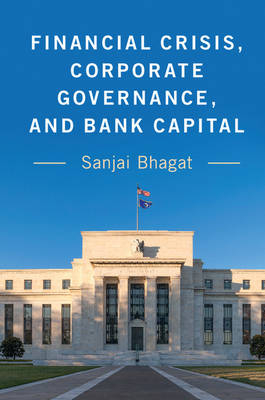
Financial Crisis, Corporate Governance, and Bank Capital
Cambridge University Press (Verlag)
978-1-107-17064-3 (ISBN)
In the aftermath of the 2007–8 crisis, senior policymakers and the media have blamed excessive risk-taking undertaken by bank executives, in response to their compensation incentives, for the crisis. The inevitable follow-up to this was to introduce stronger financial regulation, in the hope that better and more ethical behaviour can be induced. Despite the honourable intentions of regulation, such as the Dodd–Frank Act of 2010, it is clear that many big banks are still deemed too big to fail. This book argues that by restructuring executive incentive programmes to include only restricted stock and restricted stock options with very long vesting periods, and financing banks with considerably more equity, the potential of future financial crises can be minimized. It will be of great value to corporate executives, corporate board members, institutional investors and economic policymakers, as well as graduate and undergraduate students studying finance, economics and law.
Sanjai Bhagat is Provost Professor of Finance at the University of Colorado Boulder. He has worked previously at the US Securities and Exchange Commission, Princeton University, New Jersey and the University of Chicago. He is a board member of ProLink Solutions, an enterprise software company; Integra Ventures, a venture capital company; and the National Association of Corporate Directors, Colorado Chapter. He has advised US government agencies and Fortune 500 companies on corporate governance and finance issues, and has submitted several amici curiae briefs on class action litigation to the US Supreme Court, which have been cited in the high court's decision.
1. Introduction; 2. Mortgage public policies: 'cause' of the crisis; 3. Pre-crisis executive compensation and misaligned incentives; 4. Managerial incentives hypothesis versus the unforeseen risk hypothesis; 5. Bank CEOs' buys and sells during 2000–8; 6. Executive compensation reform; 7. Director compensation policy; 8. Are large banks riskier?; 9. Bank capital structure and executive compensation; 10. Why banks should be mostly debt financed: parade of non sequiturs; 11. Conclusion.
| Erscheinungsdatum | 18.03.2017 |
|---|---|
| Zusatzinfo | 22 Line drawings, black and white |
| Verlagsort | Cambridge |
| Sprache | englisch |
| Maße | 157 x 231 mm |
| Gewicht | 500 g |
| Themenwelt | Recht / Steuern ► EU / Internationales Recht |
| Wirtschaft ► Betriebswirtschaft / Management ► Finanzierung | |
| Betriebswirtschaft / Management ► Spezielle Betriebswirtschaftslehre ► Bankbetriebslehre | |
| Wirtschaft ► Volkswirtschaftslehre ► Finanzwissenschaft | |
| ISBN-10 | 1-107-17064-8 / 1107170648 |
| ISBN-13 | 978-1-107-17064-3 / 9781107170643 |
| Zustand | Neuware |
| Haben Sie eine Frage zum Produkt? |
aus dem Bereich


